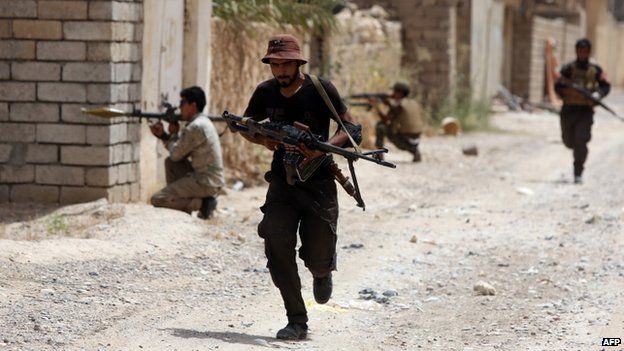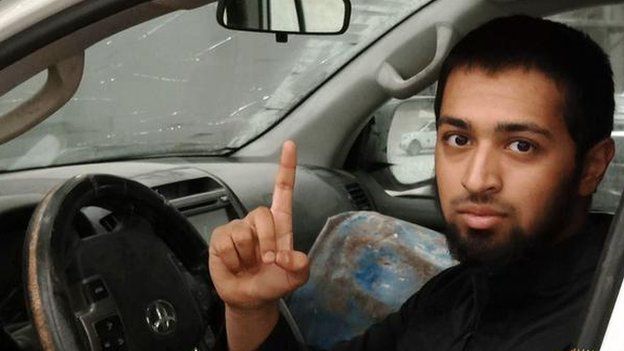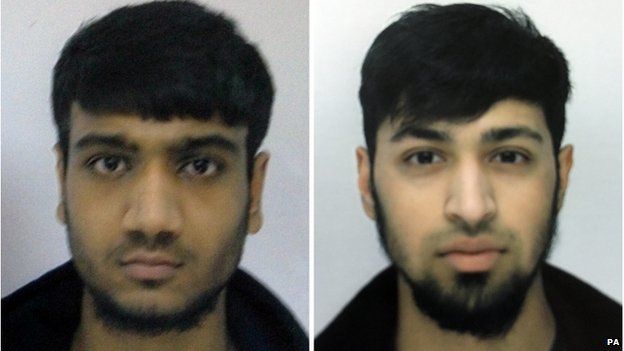- 35 minutes ago
- Leeds & West Yorkshire
Dewsbury councillor Masood Ahmed said Talha Asmal, 17, was "no different" from other teenagers and that people in the town were "shocked and devastated".
And Asmal's school principal told the Times he was a "typical teenager".
Asmal is believed to have become Britain's youngest suicide bomber in an oil refinery attack south of Baiji.
Social media reports linked to militant group Islamic State (IS) said Asmal, going by the name of Abu Yusuf al-Britani, had taken part in the attack along with three other suicide bombers.
Asmal would be Britain's youngest known suicide bomber. Another West Yorkshire teenager, Hasib Hussein, was almost 19 when he blew himself up on a London bus in the 7 July 2005 attacks.

"Communities are devastated and shocked to hear the news," said Mr Ahmed, a Labour member of Kirklees Council.
He told BBC Radio 5 live there were "no signs, no symptoms" that Asmal had been groomed by extremists online - as his family now believe he was.
"He was no different from any other teenager in terms of being loving, caring, naive, innocent. He loved sport, he was doing OK in school," Mr Ahmed said.
Lorraine Barker, executive principal of Mirfield Free Grammar and Sixth Form, where Asmal was studying, told the Times he was "very quiet and private".
"He didn't draw any attention to himself, he was just a conscientious student," she said.
She said staff and students were in "complete shock" when Asmal travelled to the Middle East.

In a statement issued on Sunday, his family said he was a "loving, kind, caring and affable teenager".
"He never harboured any ill will against anybody nor did he ever exhibit any violent, extreme or radical views of any kind," they said.
"Talha's tender years and naivety were, it seems... exploited by persons unknown who, hiding behind the anonymity of the world wide web, targeted and befriended Talha and engaged in a process of deliberate and calculated grooming of him.
"Whilst there it appears that Talha fell under the spell of individuals who continued to prey on his innocence and vulnerability to the point where, if the press reports are accurate, he was ordered to his death by so-called Isis [also known as IS] handlers and leaders too cowardly to do their own dirty work.
"We are all naturally utterly devastated and heartbroken by the unspeakable tragedy that now appears to have befallen us."

Analysis: Tom Symonds - BBC home affairs correspondent
The flow of young men and women to warzones in Syria and Iraq continues to be the biggest challenge to Britain's counter-terrorism effort.
Senior officers estimate more than 700 British citizens have now made the journey, some taking on the name "al-Britani" to signify their origins. Half have come back to the UK, posing the risk that they might plan attacks.
BBC research suggests more than 30 are still in the warzones, and possibly as many as 50.
However its estimated a third are not known to police and the security services, making their job of tracking extremists and prioritising those posing the greatest risk much harder.

'Evil' groomers
Shahid Malik, former MP for Dewsbury and a family friend of the Asmals, said: "It is disturbing to see how relaxed he looks in the Isis photographs allegedly taken just prior to his suicide mission.
"He looks at peace. It's like he's ready to go and meet his maker. This is a clear indication of just how successful the evil Isis groomers have been in poisoning and brainwashing Talha and kids like him."
IS has seized large swathes of territory in eastern Syria and across northern and western Iraq.
At least 700 people from the UK have travelled to support or fight for jihadist organisations in the area, with the majority joining IS.

Asmal travelled to Syria with fellow Dewsbury teenager Hassan Munshi.
In a statement, the Home Office said: "Since 2011, we have trained more than 160,000 people working on the front line of our public sector to identify and prevent extremism, excluded nearly 100 preachers of hate - more than any other government - and successfully taken down more than 90,000 pieces of terrorist-related material from the internet.
"We also removed or refused 30 passports in 2013 and 2014 where people were considered to be at risk of travelling to Syria or Iraq."
No comments:
Post a Comment